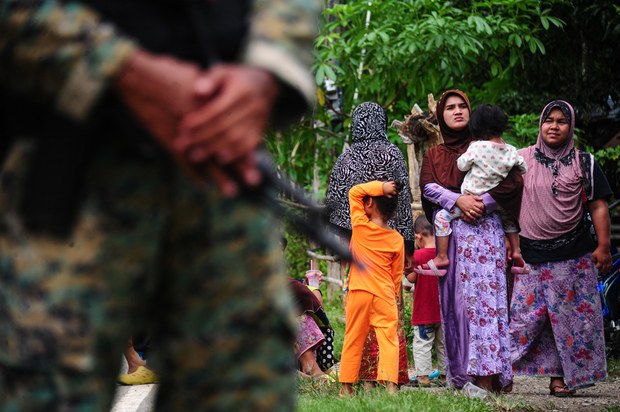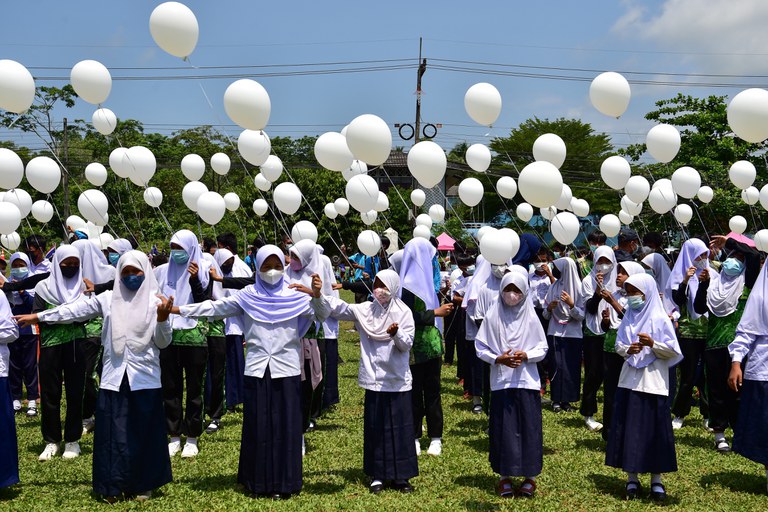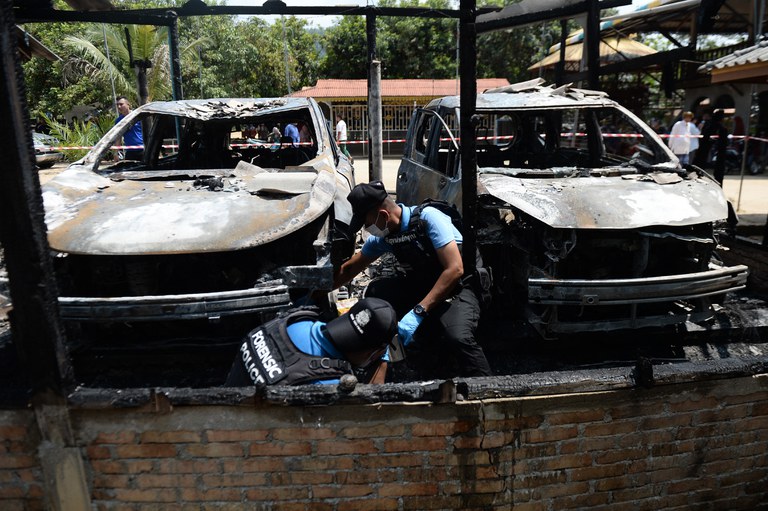Back-channel talks have pushed Thai peace talks forward, sources say
2022.03.30
Bangkok and Pattani, Thailand
 People watch as Thai police inspect the body of a suspected militant after a gunfight with government forces in Rueso, a district of Narathiwat province in southern Thailand, Oct. 30, 2016.
People watch as Thai police inspect the body of a suspected militant after a gunfight with government forces in Rueso, a district of Narathiwat province in southern Thailand, Oct. 30, 2016.
Face-to-face talks between Thailand and BRN insurgents resume in Kuala Lumpur this week in a peace process shaken up by back-channel negotiations that took place late last year without the knowledge of the official facilitator, Malaysia, BenarNews can reveal.
Malaysia was upset about the secret negotiations that were organized by an international NGO and conducted virtually in November between seven negotiators of the Barisan Revolusi Nasional (BRN), who were in Istanbul, and representatives of the Thai government, according to multiple sources with direct knowledge of the talks.
But the negotiations appeared to help propel the peace process forward, producing a three-point agreement that was subsequently discussed in Kuala Lumpur in January, when the official in-person talks between Thailand and the BRN over the long-running Deep South conflict restarted after a two-year hiatus.
In-person talks resume in Kuala Lumpur on Thursday and are scheduled to run until Saturday, officials on both sides confirmed to BenarNews.
Lt. Gen. Thira Daehwa, the secretary of a Thai government panel negotiating with the rebels to resolve a decades-old conflict in the country’s Deep South, said that a remote zoom meeting between “Party-B” and Thai officials took place in November.
“Party B” is how Thai authorities sometimes refer to the negotiating panel representing the BRN, the largest armed separatist group in Thailand’s mostly Muslim, Malay-speaking southern border region.
Asked if holding such talks without Malaysia’s knowledge could jeopardize the peace process, Thira replied, “There is nothing to worry about. We value the participation of all.”
The back-channel talks were set up by the Centre for Humanitarian Dialogue (HD), an NGO based in Switzerland, said another source with knowledge of the talks.
“Not only Malaysia was upset. BRN leadership was also very upset upon knowing this as it was done without their approval,” said the source, who was not authorized to speak to reporters and did so on condition of anonymity.
Representatives of the Geneva-based NGO did not immediately respond to BenarNews requests for comment.
The group describes itself as a private diplomacy organization whose mission is to “help prevent, mitigate, and resolve armed conflict through dialogue and mediation.”
Most of its activities are confidential, and it does comment on its discreet work “as a general policy,” according to the group’s website.

November meet produced ‘roadmap’
Sources familiar with the Deep South conflict said the November talks produced the three-point agreement that was subsequently discussed in Kuala Lumpur in January.
At the time, a Thai military official told BenarNews that Thailand’s delegation and the BRN representatives had discussed “a three-point framework which will be used as a roadmap for further talks.”
“The proposed framework includes violence reduction, political participation, and discussion mechanism in the [Deep South] region,” according to a statement from the Thai source, who requested anonymity because he, too, was not authorized to speak to reporters.
Thira, the secretary of the Thai peace talks panel, suggested that the Swiss NGO was instrumental in bringing about the agreement.
“The [Centre for Humanitarian Dialogue] got along with Party-B and could have told Party-B not to be stubborn and make some concessions, and that eventually resulted in the agreement on the three topics,” he said.
The two warring sides have been unable to agree on how to formalize the framework, and this will likely be discussed again in upcoming talks, said the anonymous source with knowledge of the negotiations.
“They had agreed on terms in Turkey … both [sides] wanted Rahim Noor to sign the paper but did not wish to put their signature on the same paper as a form of agreement,” the source said.
Abdul Rahim Noor, Malaysia’s former national police chief, is brokering the official talks on behalf of his government.
Rahim Noor “felt it was unfair for him to put his signature on the document that Malaysia was not even consulted on,” the source added.
The Malaysian facilitator declined to comment for this report in response to questions about HD’s back-channel involvement in the southern Thai peace process.

Ramadan violence reduction
The Centre for Humanitarian Dialogue waded into the Thai peace process at least once before, overseeing the so-called Berlin Initiative in 2019 that laid the groundwork for the current peace process, in which the most powerful southern insurgent group, BRN, has come to the table.
Artef Sohko, president of a political action group that promotes self-determination for the Deep South, expressed concern over recent negotiations, suggesting that agreements may have been struck without the knowledge of BRN leadership or consultation with fighters in the field.
“The fact that the BRN leaders did not discuss this matter with the combatants on the ground prior to going to the table with the Thais could very well lead to the movement breaking up. If that happens, a major spike of violence on the ground is to be expected,” he said.
The Deep South, a predominantly Muslim and ethnic Malay region, encompasses Pattani, Narathiwat, Yala provinces, and four districts of Songkhla province.
Since the insurgency reignited in January 2004, more than 7,000 people have been killed and 13,500 others injured in violence across the region, according to Deep South Watch, a local think-tank. A formal peace process to solve the issue began in 2013 but never progressed.
On Monday, BRN released a video ahead of Ramadan in which it urged the people of the Deep South to celebrate the Islamic fasting month in a peaceful manner. This year, Ramadan begins in early April.
Gen. Thira told BenarNews that the Thai side would offer at talks this week to suspend raids and arrests of suspected combatants during Ramadan.
The Thai peace dialogue panel, he said, had instructed the regional military command “to make Ramadan really peaceful by not enforcing laws against suspected insurgents during the first 20 days of the fasting month.
“And if they [BRN] create no violence at all, then in the last 10 days we will even allow them to perform Itikaf at mosques,” Thira said.
Itikaf is an Islamic practice of staying at a mosque and devoting oneself to prayer.
“It’s up to them whether or not to accept this option,” Thira said.
On Wednesday, alleged insurgents killed two policemen and injured two others in a roadside bomb attack in Bannang Sata, a district in Yala, military and police investigators said. Police were patrolling a street when the bombing incident, the second since Saturday, took place.
“Today’s incident shows that the insurgents would mount an attack whenever they have a chance,” said Col. Kiatisak Neewong, a spokesman for the military command with jurisdiction across the heavily militarized southern border region, told BenarNews.
“The army has to be patient and remain open for those who want to do a good deed during Ramadan,” he said.







